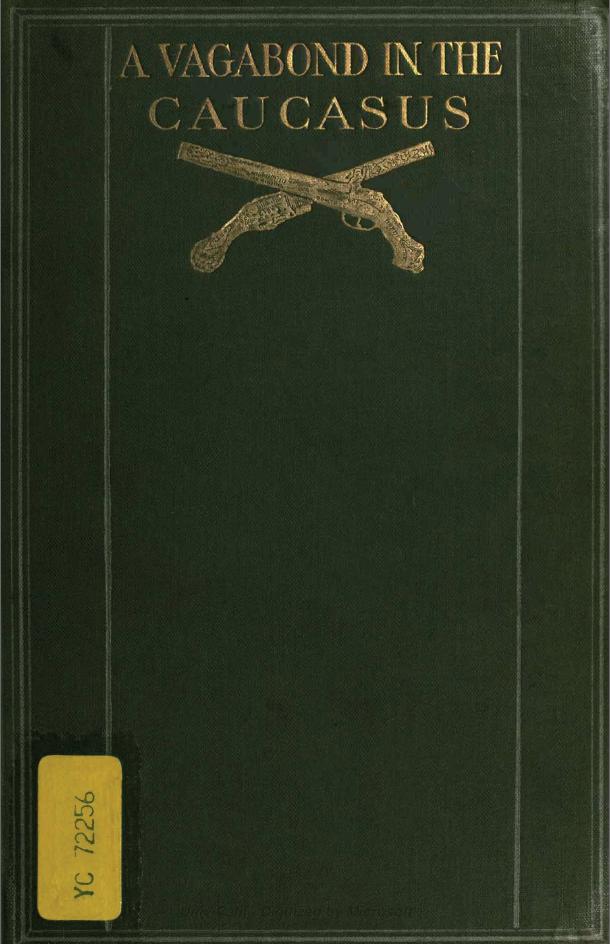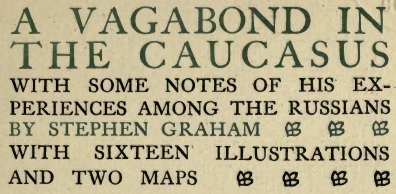APPENDIX
HOW TO GET ABOUT
A Chapter for Prospective Tourists
|
|
The following "Chapter for Prospective Tourists" was found in Stephen Graham's A Vagabond in the Caucasus, with Some Notes of his Experiences among the Russians (London: John Lane The Bodley Head, 1911), p. 301 onwards. |
|---|
THERE seems to me to be every reason why Englishmen should visit the Caucasus and see what it is like for themselves. There is no likelihood of the place being overrun, or of ordinary pleasure - seekers invading it. The Caucasus is a preserved Alps. I propose to write a few words on the facilities for seeing the country in the hope that they may be of use to some who think of touring there.
The fare from London to Vladikavkaz is:
1st class return — £19
2nd class return — £13
3rd class return — £8, 10s.
Return tickets are available for sixty days.
The tickets cannot be taken right through, and it is advisable to take them from London to Alexandrovo, the Russian frontier, and thence to Vladikavkaz. There are various companies which issue tickets for Alexandrovo, the Great Eastern Railway Company, the London, Chatham and Dover, and the Belgium State Railway Company, 52 Gracechurch Street, E.C. The lastnamed is the only company issuing third-class tickets. It is as convenient to travel third as to travel second in Belgium and Germany. In Russia, however, it is extremely inconvenient to travel third class. The carriages are dirty, and the passengers Russian peasants, and the seats are wooden. First and second-class compartments are very comfortable, and one may be fairly sure of sleeping at night, since a ticket entitles one to the whole length of a seat.
The train takes five days from Alexandrovo, with changes at Warsaw (here one has to cross the town from the Viensky to the Brestky Station, the fare for which by droshky is one rouble), Kiev, Poltava and Rostof. There is, however, a fast train, Warsaw-Rostof (first and second class only), which enables one to do the journey in two days less. A special ticket (platzkaart), costing 10s., has to be bought at the Brestky Station, Warsaw. The train leaves that station at 5.11 p.m.
Another route is by train to Odessa (tickets may be taken from London to Odessa), and thence by boat to Novorossisk, Sukhum or Batum.
The fares are:
|
PORT. |
NOVOROSSISK. |
|||
|---|---|---|---|---|
|
CLASS. |
With Meals. |
Without Meals. |
||
|
1st |
2nd |
2nd |
3rd |
|
|
Fares from Odessa |
27.30 roubles |
19.90 roubles |
14.40 roubles |
5.45 roubles |
|
SUKHUM. |
||||
|
38.15 roubles |
27.50 roubles |
19.40 roubles |
6.50 roubles |
|
|
BATUM. |
||||
|
42.10 roubles |
30.30 roubles |
21.19 roubles |
7.50 roubles |
|
Another route is via St Petersburg and Moscow. Boats carry passengers to St Petersburg at various fares, and the [single] ticket to Vladikavkaz from St Petersburg costs:
1st class — 46 roubles 20 copecks, or £4, 15s.
2nd class — 26 roubles 95 copecks, or £2, 16s.
3rd class — 15 roubles 40 copecks, or £1, 11s.
It is a long and tiring journey, and one will appreciate the pleasure of lounging in Vladikavkaz for a few days. The hotels are good, and rooms can be taken from a rouble (two shillings) a day. From Vladikavkaz the celebrated Georgian road runs to Tiflis—150 miles. There are various conveyances, and I append the fares:
By motor omnibus from the Grand Hotel — 30 roubles — 1 day
By diligence coach — 10 roubles — 2 days
By carriage and pair — 70 roubles — 2 days
By four-seated lineika (jaunting-car) — 45 roubles — 3 days
By furgon (a van) — 3 roubles — 4 days
(This last must be bargained for beforehand.)
Night accommodation at the post-stations is free, except for a charge of 3d. or 4d. for linen.
Instead of going by any of these conveyances one may walk, and in that way the tourist will undoubtedly see more of the country and of the people. Any passing cart will give one a lift at the rate of about 12 miles for 6d. Food of a rough kind is obtainable at the dukhans, of which there are hundreds; bread is 1¼d. (5 copecks) a pound, and eggs (cooked) two a penny or less; wine, 1d. a glass; milk as in England; tea, ad lib, 2½d.; mutton, 2½d. a plate; chicken, 3d. or 4d. a plate. [A Russian copeck corresponds to an English farthing, and a rouble is 100 copecks and is approximately worth 2s.] For a rouble one can get an ordinary hot Russian dinner at the post stations. Tiflis hotels are on a level with those of Vladikavkaz—the best is the Vetsel, with rooms from one to eight roubles a day.
The Trans-Caucasian railway runs from Tiflis to Batum, a distance of three hundred miles, and passes through some of the most beautiful of the southern country. It runs via Kutais, and this town is connected with Vladikavkaz by a road two hundred miles long, which one may travel partly by stage coach from Kutais to Oni&mdash110 versts, fare about six roubles. The road onward is only open to traffic from June to September, and there are no regular conveyances. One can take a lineika for thirty roubles. The lineika is a low jaunting car, having no protection either against wind or rain. One sits sideways, and one's feet dangle beside the wheels. It has springs and is comfortable enough in fine weather. It is the best vehicle available on this road. The journey over the Mamison Pass, 9281 feet high, may be extremely cold and stormy, and it is advisable to start in the finest weather. A snowstorm in midsummer is by no means unusual. Near Lisri there is a by-road of extraordinary grandeur to Kobi on the Georgian road.
To see Elbruz it is best to go to Kislovodsk by rail from Vladikavkaz (260 versts). Kislovodsk is the most fashionable watering-place in Russia.
It is extremely interesting to go by boat from Novorossisk to Batum, calling at each of the thirteen Caucasian ports on the Black Sea—Gilendzhik, Dzhubra, Tuapse, Lazarevsky, Sochi, Adler, Gagri, Gudaut, Novy Afon, Sukhum, Ochemchiri, Batum.
From Sukhum there is a road to Kislovodsk, 300 versts, crossing the Klukhorsky Pass, 9600 feet high.
One can generally obtain a conveyance at the rate of three roubles a day, and the journey, if continuous, would take about ten days. It is possible, however, to do it in four days in a phaeton, and this would cost not less than 100 roubles for the journey. In many places this so-called road degenerates to a mere track broken by rocks and overwashed by waterfalls. It is certainly more convenient to drive than to walk in the higher parts.
Besides these roads there are hundreds of tracks leading to the fastnesses of the mountains, and these are more or less difficult and wild. They can only be explored by the horseman or the pedestrian, and the former needs to have a sure seat. Horses may be hired at 2 for the summer, or may be bought entirely at prices ranging from 5 upwards. It may be mentioned, however, that the natives, especially the Ingooshi, are expert horse thieves.
Russian is the only language of any value in the Caucasus, and the tourist should know at least a smattering of it. It is most important to realise that the natives speak an extremely childish and simple language that is easily understood. It is unnecessary to know more than the elements of the language and a good assortment of useful words. A Berlitz course, or something similar, taught by a Russian teacher, is probably the most useful. One should certainly carry a pocket dictionary.
Much is said of the danger of travelling in the Caucasus, especially by Russians, but there is truly little danger. It is likely that an English traveller will have queer adventures, but unlikely that he will come to harm. I never took my revolver out once on my tramps, but doubtless many people would feel more secure with a weapon in their pocket. One thing may be warned keep out of the way of the police. The whole police system of the Caucasus is corrupt, and innocent or guilty, English or Russian, one is not likely to get out of their hands easily. Permission to carry firearms into Russia must be obtained through the Russian Consul General in London, and application should be made six weeks in advance.
The outfit may be best purchased in England, but the black sheepskin cloaks worn by many people in the Caucasus are extremely serviceable, being warm and completely waterproof; they can be bought in the towns for ten roubles. It is well to look passably welldressed on the road, as that ensures respect and courteous treatment. Good manners help one immensely in any difficulty. There is a sort of custom in Russia when entering a shop to salute the shopkeeper and say "Zdrast-vit-ye!" I, for my part, when tramping, would always bow comprehensively to the shopkeeper and the company in the shop especially if it is an inn.
On entering a shop, a Russian commonly inquires the price of everything there, and the shopman doesn't feel vexed if, after turning over all his wares, nothing is bought. Whereas, if one merely buys a penny glass of wine and drinks it politely, one is wished well on one's journey, the whole company is pleased, and when one goes away the innkeeper says, "There goes an Englishman—a fine man!"
Unless stated otherwise or obviously not the case, all the text and images on this website are © A.J.T. Bainbridge 2006-2014
Do get in touch! Gmail: alexjtb


